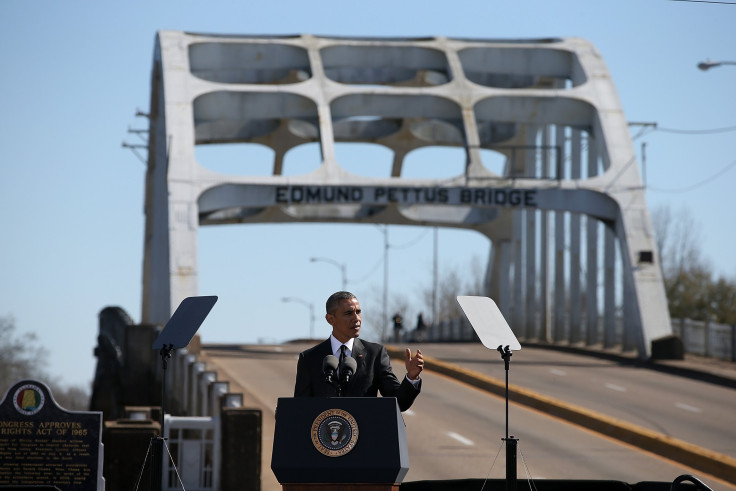Obama Selma Speech: 'Nonviolent Change Is Possible,' President Says During Bloody Sunday Anniversary

U.S. President Barack Obama urged Americans Saturday to seek and strive for nonviolent change, just like the hundreds of peaceful protesters in Selma, Alabama, 50 years ago. The president spoke in Alabama to mark the 50th anniversary of the civil rights march from Selma to the state capital, during which police violently attacked 600 unarmed demonstrators.
Obama spoke at the foot of the Edmund Pettus Bridge where the marchers fought for civil rights without using violence in the face of brutality and hatred. His remarks alluded to the violent protests that rocked Ferguson, Missouri, last year after a white police officer shot to death an unarmed black teenager.
“What they did here will reverberate through the ages, not because the change they won was preordained, not because their victory was complete,” Obama said Saturday. “But because they proved that nonviolent change is possible. That love and hope can conquer hate.”
It was Obama’s first trip to Selma since taking office in 2009. First lady Michelle Obama joined the president on stage along with former President George Bush, former first lady Laura Bush and U.S. Rep John Lewis, D-Ga.
A sea of people listened intently and held placards that read “We need change” and “Please stop killing us.” A small group of protesters began banging a drum and chanting, “We want change,” during Obama’s speech, until police ushered the demonstrators away.
Selma birthed a civil rights movement March 7, 1965, when peaceful protesters began the first of three marches to walk the 54-mile highway from the city to Montgomery. It was nicknamed Bloody Sunday after state troopers beat the civil-rights demonstrators with billy clubs and whips, and fired tear gas. Today, the route from Selma to Montgomery is memorialized as a U.S. National Historic Trail.
Lewis, who took part in the Selma march, recalled the events of 1965 during remarks at the gathering. "Our country will never, ever be the same because of what happened on this bridge,” the congressman said. “But we never became bitter or hostile. We kept believing.”
Lewis spoke powerfully, urging America to “build on the legacy of the march,” because there is still work to be done. “I say to you don’t give up on the things that bring meaning to you. Don't get lost in a sea of despair. Stand up for what you believe,” he said loudly, garnering applause and cheers. “We all live in the same house. The American house.”
The violence in Selma sparked national outrage, with Martin Luther King Jr. seeking federal protection for the marchers and a new federal voting rights law to enable African-Americans to vote without harassment. The Voting Rights Act, a landmark piece of civil rights legislation that prohibits racial discrimination in voting, was signed into law in August of that year , according to the National Voting Rights Museum and Institute in Selma.
© Copyright IBTimes 2024. All rights reserved.





















